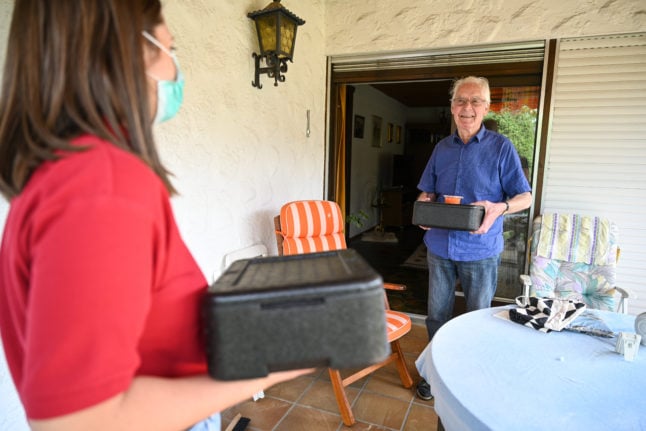How to do a voluntary social year in Germany

One way to spend time in Germany and get to know the local culture and language is to embark on what's known as a voluntary social year. Here's how to get started.
Every year around 53,000 young people complete what's known as a Voluntary Social Year (FJS) in Germany. It can be a great opportunity to learn new skills, improve your German and get a sense of direction in your career. Here's what you need to know.
What is a Voluntary Social Year?
A Freiwilliges Soziales Jahr (FSJ), or voluntary social year, is a way for young people to find direction and contribute to society after leaving secondary school. It has its roots in Philadelphischer Dienst, a program set up in 1962 to provide young women with an alternative to the military service undertaken by the men.
Generally, people doing an FSJ will choose a voluntary placement lasting anywhere between six and eighteen months. These placements can be immensely varied, but generally fall under the umbrella of the social sector, such as working in a care home, with refugees, in a hospital or with children from difficult family backgrounds.
READ ALSO: Germany struggling to fill tens of thousands of trainee jobs
Over the course of their placement, volunteers get a small allowance for food and transport known as "pocket money", and sometimes also have access to accommodation or receive a bit of money towards their accommodation. They generally receive hands-on training from the institution they choose to do their FSJ with as well as being integrated into the culture and work life that exists there.
The hours you volunteer, as well as other aspects of the placement like the hours and remuneration, will generally be determined by the institution offering the placement.
Who's eligible to apply for one?
Generally, anyone under the age of 27 who has completed their final year of secondary school is eligible to apply for an FSJ - though different institutions may have different requirements.
Both EU and non-EU citizens are permitted to apply, but it's trickier for non-EU citizens as they will need to secure a visa that allows them to both live and work in Germany.

A volunteers brings food to the elderly. Photo: picture alliance/dpa | Felix Kästle
Usually, the institution offering the placement will assist third-country nationals with their visa application.
However, while EU students have an automatic right to live and work in Germany, they will have to prove they can support themselves for the duration of the placement - so it's a good idea to build up some savings.
READ ALSO: The most expensive (and cheapest) cities in Germany to rent a room
How do I find a placement?
Numerous online search portals are around to help connect potential volunteers with placement listings, while you can usually narrow sound by the sector you want to work in and the location.
A couple of examples of these are the website Ich will FSJ and Ein Jahr Freiwillig, where you can find numerous positions to apply for. It can help narrow it down if you know what kind of place you want to volunteer for and where in Germany you'd most like to live.
Once you've found your placement, you'll need to send an application, which normally includes details or your school grades, a letter of motivation, and any relevant experience. Be sure to discuss the specific requirements for applications with the institution you want to apply to, as these can often vary from place to place.
READ ALSO:
Comments
See Also
Every year around 53,000 young people complete what's known as a Voluntary Social Year (FJS) in Germany. It can be a great opportunity to learn new skills, improve your German and get a sense of direction in your career. Here's what you need to know.
What is a Voluntary Social Year?
A Freiwilliges Soziales Jahr (FSJ), or voluntary social year, is a way for young people to find direction and contribute to society after leaving secondary school. It has its roots in Philadelphischer Dienst, a program set up in 1962 to provide young women with an alternative to the military service undertaken by the men.
Generally, people doing an FSJ will choose a voluntary placement lasting anywhere between six and eighteen months. These placements can be immensely varied, but generally fall under the umbrella of the social sector, such as working in a care home, with refugees, in a hospital or with children from difficult family backgrounds.
READ ALSO: Germany struggling to fill tens of thousands of trainee jobs
Over the course of their placement, volunteers get a small allowance for food and transport known as "pocket money", and sometimes also have access to accommodation or receive a bit of money towards their accommodation. They generally receive hands-on training from the institution they choose to do their FSJ with as well as being integrated into the culture and work life that exists there.
The hours you volunteer, as well as other aspects of the placement like the hours and remuneration, will generally be determined by the institution offering the placement.
Who's eligible to apply for one?
Generally, anyone under the age of 27 who has completed their final year of secondary school is eligible to apply for an FSJ - though different institutions may have different requirements.
Both EU and non-EU citizens are permitted to apply, but it's trickier for non-EU citizens as they will need to secure a visa that allows them to both live and work in Germany.

Usually, the institution offering the placement will assist third-country nationals with their visa application.
However, while EU students have an automatic right to live and work in Germany, they will have to prove they can support themselves for the duration of the placement - so it's a good idea to build up some savings.
READ ALSO: The most expensive (and cheapest) cities in Germany to rent a room
How do I find a placement?
Numerous online search portals are around to help connect potential volunteers with placement listings, while you can usually narrow sound by the sector you want to work in and the location.
A couple of examples of these are the website Ich will FSJ and Ein Jahr Freiwillig, where you can find numerous positions to apply for. It can help narrow it down if you know what kind of place you want to volunteer for and where in Germany you'd most like to live.
Once you've found your placement, you'll need to send an application, which normally includes details or your school grades, a letter of motivation, and any relevant experience. Be sure to discuss the specific requirements for applications with the institution you want to apply to, as these can often vary from place to place.
READ ALSO:
Join the conversation in our comments section below. Share your own views and experience and if you have a question or suggestion for our journalists then email us at [email protected].
Please keep comments civil, constructive and on topic – and make sure to read our terms of use before getting involved.
Please log in here to leave a comment.